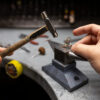When your air conditioner’s compressor encounters issues, it can lead to a slew of performance problems that can turn a comfortably cool home into an uncomfortable space. The compressor is often referred to as the “heart” of an air conditioning system, and when it is in disrepair, the whole system suffers.
Whether you’re a DIY enthusiast or simply seeking to be more informed about the workings of your AC unit, this guide aims to empower you with the knowledge you need to tackle compressor troubles head-on.
So, if you’re facing the dreaded compressor problem, this guide will be your go-to roadmap for AC repair in Greeley!
1. Failure to start
A compressor that fails to start often indicates electrical issues, such as a tripped circuit breaker, faulty capacitors, or damaged wiring. Start by checking your home’s electrical panel for any tripped breakers and resetting them if necessary.
Next, inspect the capacitor, which provides the necessary jolt to start the compressor motor. A swollen or leaking capacitor indicates a failure and should be replaced. Lastly, check the electrical wiring for any signs of wear, damage, or disconnections.
If wiring issues are observed, it is best to seek advice from a professional, as improper handling can be hazardous. Always ensure the power is turned off before investigating electrical components to avoid the risk of electric shock.
2. Noisy operation
Unusual sounds from your air conditioner compressor can be an alarm for immediate attention. Noises such as rattling, buzzing, or hissing may indicate issues ranging from loose parts to refrigerant leaks. Rattling often suggests that there could be loose hardware or debris within the unit, whereas a buzzing noise could denote an electrical issue.
To troubleshoot, start by switching off the unit and performing a visual inspection to find any loose components causing the noise. Tighten any loose fittings and remove debris. If the sound is more of a hissing and is accompanied by inadequate cooling, it may point toward a refrigerant leak, which usually requires a professional to repair.
Regular AC system maintenance can prevent many noise-related problems before they start. Remember, if the issue is beyond your skill level, it’s always safer and more effective to enlist the help of a certified technician.
3. Compressor overheating
Compressor overheating is often a symptom of underlying issues, such as poor airflow, a dirty condenser coil, or a malfunctioning fan. If not addressed promptly, an overheated compressor can lead to thermal overload and system failure.
To troubleshoot an overheating compressor, ensure sufficient clearance around the condensing unit to promote proper airflow. Next, check the condenser coil for dirt, debris, or vegetation that might be restricting air passage and clean it carefully. Additionally, verify that the condenser fan is operating correctly and isn’t obstructed or damaged.
Regular cleaning of the air filter and condenser coils and ensuring the fan’s functionality are essential preventative measures.
However, suppose the compressor continues to overheat after these steps. In that case, it might be due to more serious issues like a refrigerant imbalance or electrical failures, which require professional assessment and repair. Always remember to turn off the unit’s power before troubleshooting.
4. Short cycling
Short cycling occurs when an air conditioner compressor turns on and off more frequently than usual, failing to complete a full cooling cycle. This erratic behavior can be caused by various issues, such as an oversized AC unit, a clogged air filter, low refrigerant levels, or even a faulty thermostat.
To troubleshoot short cycling:
- Begin by inspecting the air filter and replacing it if it’s dirty to ensure proper airflow.
- Examine the thermostat for malfunctions and verify that it is not positioned in direct sunlight or near heat sources, as these could affect its readings.
- Inspect the refrigerant levels; low refrigerant could cause the unit to shut off prematurely.
If these steps do not resolve the issue, your AC unit may be too large for your space. An oversized unit will cool the space faster, but it won’t effectively remove humidity or run long enough to complete a full cycle, leading to short cycling.
This scenario requires consulting with a professional to discuss potential solutions, which include replacing the unit with one that is correctly sized for your home. Always remember to disconnect the power to the system before attempting any troubleshooting to ensure your safety.









